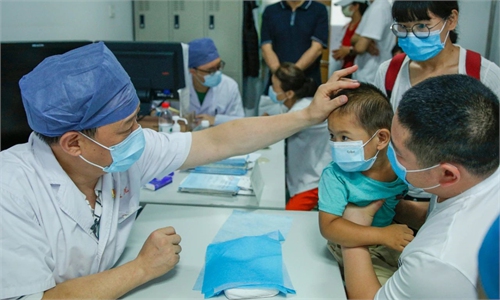
A counter for deposit and insurance at a bank in Zhengzhou, Central China's Henan Province File photo: VCG
Four days after its inauguration, China's National Administration of Financial Regulation (NAFR) announced a previously held meeting, focusing on the operation of the domestic insurance industry, while stressing its role in strengthening regulation and deepening reforms in the financial sector.
The insurance industry, one of the NAFR's areas of oversight, performed beyond expectations in the first quarter. The average comprehensive solvency adequacy ratio of the 185 insurance companies included in the review reached 190.3 percent, and the average core solvency adequacy ratio was 125.7 percent, said the watchdog.
The decline in the solvency adequacy ratio narrowed significantly in the first quarter and remained within a reasonable range, it added.
The solvency ratio is a key metric of an insurer's ability to meet its debt and other obligations.
Original insurance premium income came in at 1.95 trillion yuan ($278 billion) in the first quarter, an increase of 9.2 percent on a yearly basis. The annualized comprehensive investment yield of insurance funds stood at 5.24 percent, showing a positive trend of recovery.
The NAFR will strengthen the functional supervision and penetrating supervision of insurance companies and set hard constraints on solvency, in a bid to promote the high-quality development of the insurance industry, according to the meeting.
It also stressed its three major tasks - serving the real economy, preventing and controlling financial risks, and deepening financial reforms.
"The meeting was the first one following the adjustment and optimization of China's financial supervision system. Through revealing key data in the insurance industry, it will further strengthen confidence in future development," Dong Shaopeng, a senior research fellow at the Chongyang Institute for Financial Studies at the Renmin University of China, told the Global Times on Monday.
The NAFR was officially set up on Thursday as a new financial regulator, representing a significant step in the country's institutional reform of financial supervision.
The plan to set up the administration was adopted by the national legislature in March.
Directly under the State Council, the country's cabinet, the NAFR was formed on the basis of the China Banking and Insurance Regulatory Commission, a financial watchdog that existed for more than five years.
The new body is in charge of regulating the financial industry, with the exception of the securities sector, which is still overseen by the China Securities Regulatory Commission (CSRC). The NAFR will take over certain functions of the People's Bank of China, the country's central bank, and the CSRC.
Dong said that the NAFR will hold a relevant meeting focused on the banking sector in the near future.
"All financial sectors except for securities are within the supervision scope of the new administration, which will effectively avoid the phenomenon of 'regulatory gaps' that occurred in the past," Lian Ping, chief economist and head of the Zhixin Investment Research Institute, told the Global Times.
Such a milestone reform is conducive to the implementation of effective financial supervision from the beginning of financial innovation. "It is helpful to manage and control the hidden risks that accompany financial innovation, and truly realize the full coverage of financial supervision," Lian noted.
With all financial activities included in the agency's supervision scope and all supervision implemented in a unified manner, it will help strengthen the unity of legal and market constraints, which is necessary to optimize the business environment, according to Dong.
Li Yunze, the Party chief of the new financial regulator, vowed at the Thursday ceremony of nameplate unveiling that the government will comprehensively strengthen financial organizations' institutional, behavioral and functional supervision, providing strong support and guarantees for building a new development pattern and promoting the country's high-quality development.




